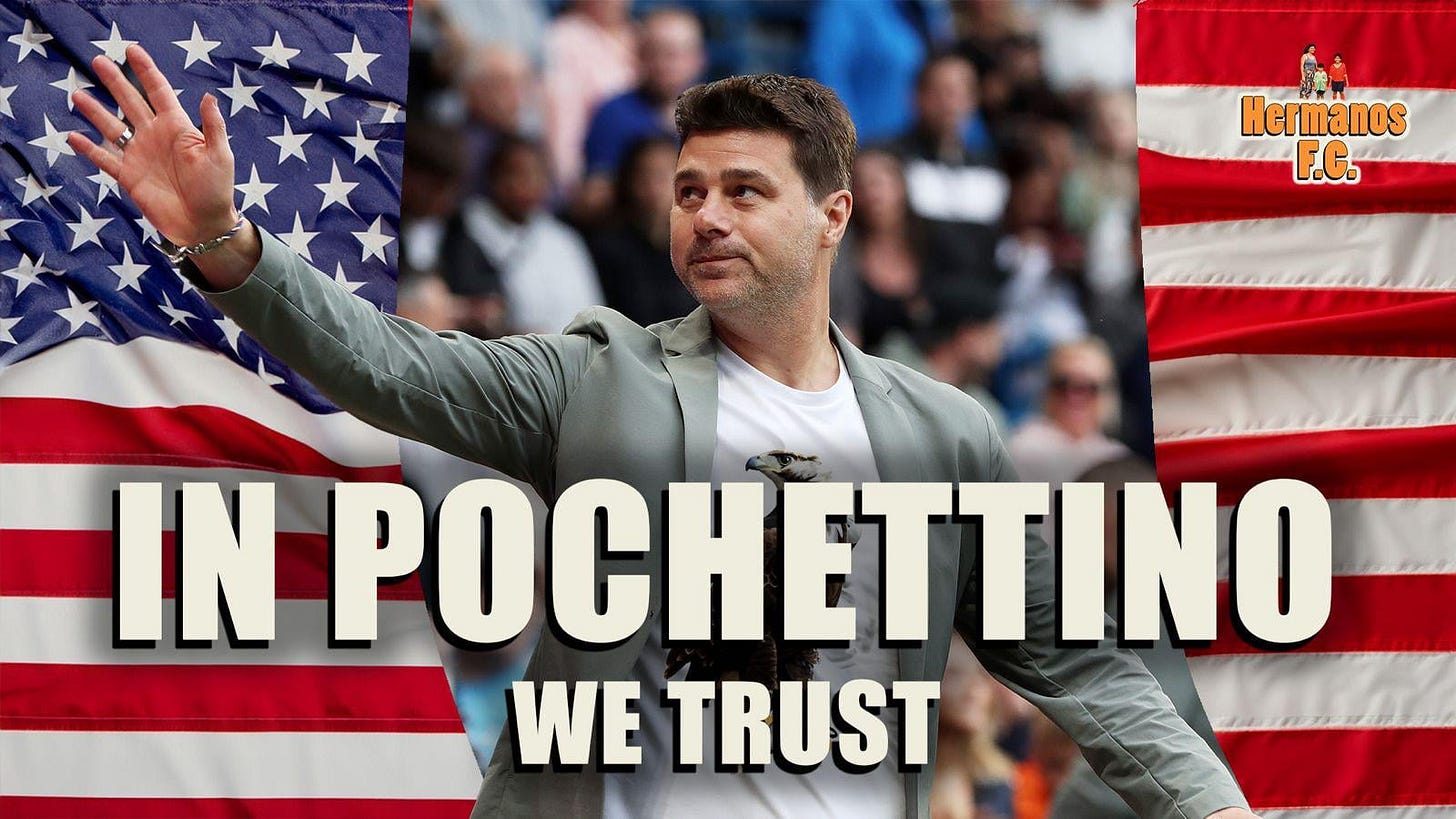five quotes (8.16.24)
five things I read the week the united states hired mauricio pochettino to coach the men's national team (!!!!!!)
1) “Something in all this evokes the religious tradition of the Sabbath, in which you down tools not because the work is finished, but just because it’s Friday night or Sunday morning, and so it’s time to stop anyway. “Stopping anyway” – stopping in the knowledge that for finite humans, the work is never done – reorients you to the depth of the present moment. It helps you stop ceaselessly chasing the imaginary future point at which everything will have been handled, so that life can really begin. It’s a reminder that life has already really begun: that this is it. And it permits you to sit back and receive life for an hour or two – to enjoy it confident in the knowledge that you did what you could today, and that when tomorrow rolls around, you’ll do what you can then, too.”
—Oliver Burkeman, “What would it mean to be done for the day?” (Newsletter)
Oh, man. What a great little article this is. Here’s a link to the video that inspired Burkeman’s thoughts. It’s a very thoughtful, peaceful reflection and apropos (for me, at least) at the beginning of a new school year. I have moved into an administrative position this year; I now bear the lofty title Dean of Humanities. And every night I leave the office knowing that there is more that I could do. The work is endless, of sorts. I appreciate Burkeman’s idea of “stopping anyway.” Sometimes, the most humane thing we can do (and the best, actually, for our company/institution) is to walk away for the night. There is no completion, no moment where we’ve cleaned out every inbox and checked off every to-do item and read every article or followed up with every conversation. But there is rest and peace in just letting it go for the day. God’s mercy, and your to-do list, are renewed every morning.
2) “Some teachers encourage students to use AI to help with research or to provide feedback on ideas. The problem is when students have an app like ChatGPT do all the work and don’t even know what they are handing in. Last year, Josh McCrain, a political-science professor at the University of Utah, gave students a writing assignment that included, in indecipherable small text, instructions to include a reference to Batman. If they copy and pasted the assignment into AI, the instructions would be incorporated. Sure enough, a handful of students turned in papers with nonsensical references to Batman.”
—Deepa Seetharaman, “There’s a Tool to Catch Students Cheating With ChatGPT. OpenAI Hasn’t Released It.” (Wall Street Journal)
This was an interesting revelation: OpenAI knows exactly how students are using it and is afraid of alienating part of their customer base by doing anything to address the malfeasance. Also, this is hilarious. The cold truth of cheating is that where there’s a will, there’s a way. Students’ motivation to avoid work generally outstrips a teacher’s desire and ability to catch every instance of cheating. The obvious play for the Humanities classroom is going to be more handwritten work completed during classtime. It will increasingly be the only work that can truly be trusted to be a student’s own.
3) “The educators I spoke to seem to have the right attitude of skeptical practicality: They know A.I. isn’t going away, so they aren’t banning it from their classrooms, but they are mostly unconvinced of its transformative properties and aware of its pitfalls. There’s a reason only 6 percent of American public school teachers think that A.I. tools produce more benefit than harm.
I’m more worried about the policymakers who appear to have drunk the Kool-Aid on artificial intelligence: Some seem to believe that we’re peering into a kind of open maw that will eventually swallow all of our jobs and educational processes, so we better acquiesce, or else.”
—Jessica Grose, “A.I. Could Ruin Kids’ Critical Thinking Skills” (New York Times Subscriber Newsletter)
Related to this, in her latest newsletter, Jessica Grose interviewed some current teachers for how they are handling AI in the classroom. The main takeaway is found in the title. AI can be super useful once you’ve acquired the skills of critical thinking and discovered your own voice and style as a writer. As shortcuts to those ends, however, AI is extremely damaging. Even in something like coding, my friends who find so much value in it already learned to code and mastered it through hundreds of hours of fastidious coding trial and error. They can now use it to check code for errors or help them with big tasks, but they can use it usefully because they know what they are looking for. When kids never learn the critical thinking on the front end, AI becomes a crutch, not a tool.
4) “In a sense, Americans have been training themselves for years to become eager users of gambling tech. Smartphone-app design, as has been amply reported, relies on the “variable reward” method of habit formation to get people hooked—the same mechanism that casinos use to keep people playing games and pulling levers. When Instagram sends notifications about likes or worthwhile posts, people are impelled to open the app and start scrolling; when sports-betting apps send push alerts about fantastic parlays, people are coaxed into placing one more bet.”
—Christine Emba, “Gambling Enters the Family Zone” (The Atlantic)
In case it isn’t clear yet, I hate our new laissez-faire attitude toward gambling. The thing with vice is that most people can be dabblers: they can have a drink, a toke, a cigarette, an occasional online sports bet, etc. But, there is a percentage of the population that decidedly cannot stop at the moderate level. They will become addicts and it will ruin their lives. But, in our culture, where we owe nothing to anyone but ourselves (and our own pleasure), this is fine. Those addicts should just exert more willpower, or something. And Emba is exactly right in what she says here: smartphones have been grooming us for online gambling; many of us will be helpless against its pull.
“It is huge to land one of the best coaches from the club game to manage the men’s national team. The closest comparison might be Jurgen Klinsmann, the former Germany striker who coached the USMNT from 2011 to 2016, but Pochettino comes to the job with far more of a track record in European club football management than he did. . . Pochettino, by contrast, has been one of the most impressive coaches in the European club game for the past 15 years. What he did at Tottenham remains one of the best-sustained spells of management in recent years, even if it did not end up with them winning any trophies.”
—Jack Pitt-Brooke, “Who is Mauricio Pochettino? Is this a coup for the USMNT? Will it help them at 2026 World Cup?” (The Athletic)
I wanted this to be the first article because I am literally, allegorically, morally, and anagogically dancing on clouds. My favorite football manager of all time, the man who almost (so close!!!) got my beloved Tottenham Hotspur (Tottenham Hotspur!!!) to the football Promised Land is now the United States Men’s National Team head coach. We’re winning the World Cup. . . or at least losing in the final on a dubiously given Moussa Sissoko handball. It’s a great day to be an American!
I mean, come on, how is this a penalty? Unless you’re a Liverpool fan, you have to admit that this ruined the Champions League Final in the first minute. I will go to my grave believing this.




